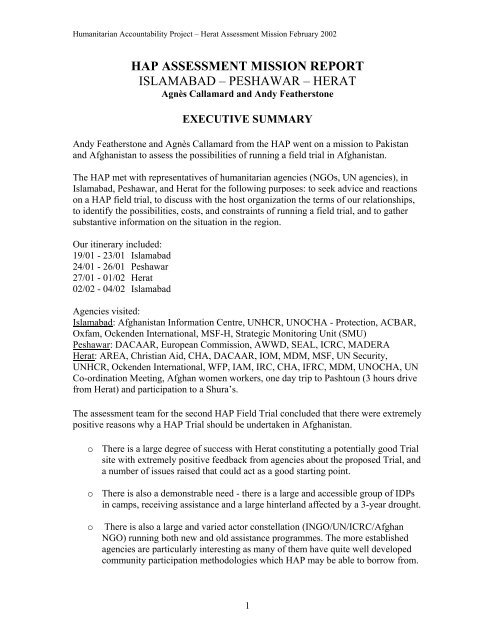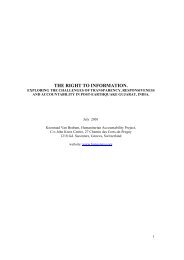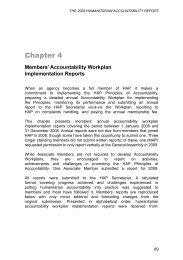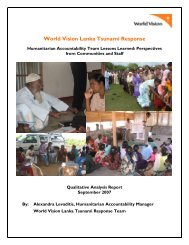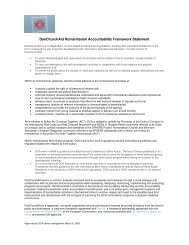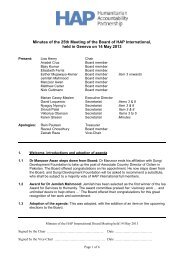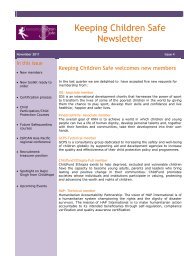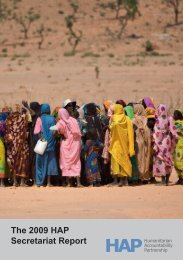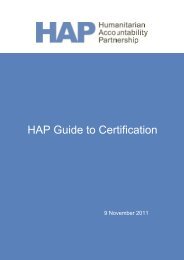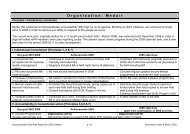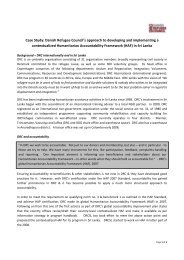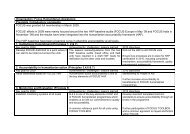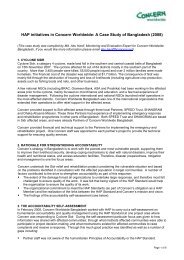HAP Afghanistan Field Trial - Assessment Report - HAP International
HAP Afghanistan Field Trial - Assessment Report - HAP International
HAP Afghanistan Field Trial - Assessment Report - HAP International
You also want an ePaper? Increase the reach of your titles
YUMPU automatically turns print PDFs into web optimized ePapers that Google loves.
Humanitarian Accountability Project – Herat <strong>Assessment</strong> Mission February 2002<br />
<strong>HAP</strong> ASSESSMENT MISSION REPORT<br />
ISLAMABAD – PESHAWAR – HERAT<br />
Agnès Callamard and Andy Featherstone<br />
EXECUTIVE SUMMARY<br />
Andy Featherstone and Agnès Callamard from the <strong>HAP</strong> went on a mission to Pakistan<br />
and <strong>Afghanistan</strong> to assess the possibilities of running a field trial in <strong>Afghanistan</strong>.<br />
The <strong>HAP</strong> met with representatives of humanitarian agencies (NGOs, UN agencies), in<br />
Islamabad, Peshawar, and Herat for the following purposes: to seek advice and reactions<br />
on a <strong>HAP</strong> field trial, to discuss with the host organization the terms of our relationships,<br />
to identify the possibilities, costs, and constraints of running a field trial, and to gather<br />
substantive information on the situation in the region.<br />
Our itinerary included:<br />
19/01 - 23/01 Islamabad<br />
24/01 - 26/01 Peshawar<br />
27/01 - 01/02 Herat<br />
02/02 - 04/02 Islamabad<br />
Agencies visited:<br />
Islamabad: <strong>Afghanistan</strong> Information Centre, UNHCR, UNOCHA - Protection, ACBAR,<br />
Oxfam, Ockenden <strong>International</strong>, MSF-H, Strategic Monitoring Unit (SMU)<br />
Peshawar: DACAAR, European Commission, AWWD, SEAL, ICRC, MADERA<br />
Herat: AREA, Christian Aid, CHA, DACAAR, IOM, MDM, MSF, UN Security,<br />
UNHCR, Ockenden <strong>International</strong>, WFP, IAM, IRC, CHA, IFRC, MDM, UNOCHA, UN<br />
Co-ordination Meeting, Afghan women workers, one day trip to Pashtoun (3 hours drive<br />
from Herat) and participation to a Shura’s.<br />
The assessment team for the second <strong>HAP</strong> <strong>Field</strong> <strong>Trial</strong> concluded that there were extremely<br />
positive reasons why a <strong>HAP</strong> <strong>Trial</strong> should be undertaken in <strong>Afghanistan</strong>.<br />
o There is a large degree of success with Herat constituting a potentially good <strong>Trial</strong><br />
site with extremely positive feedback from agencies about the proposed <strong>Trial</strong>, and<br />
a number of issues raised that could act as a good starting point.<br />
o There is also a demonstrable need - there is a large and accessible group of IDPs<br />
in camps, receiving assistance and a large hinterland affected by a 3-year drought.<br />
o There is also a large and varied actor constellation (INGO/UN/ICRC/Afghan<br />
NGO) running both new and old assistance programmes. The more established<br />
agencies are particularly interesting as many of them have quite well developed<br />
community participation methodologies which <strong>HAP</strong> may be able to borrow from.<br />
1
Humanitarian Accountability Project – Herat <strong>Assessment</strong> Mission February 2002<br />
o The “humanitarian” operation in <strong>Afghanistan</strong> raises many coordination and<br />
accountability issues, some of which are presented in the second part of this<br />
document.<br />
At the same time, the team also recognized that a trial would pose large operational<br />
difficulties, that it would require support from the Host Agency.<br />
o The main constraining factors are operational and include security, logistics and<br />
staffing and the level of support the host agency may be able to offer, given its<br />
own operational needs and priorities.<br />
o The issue of support is fundamental to the success of the project. The <strong>HAP</strong> team<br />
will need to rely quite heavily on the Host Agency for admin/logistics support<br />
especially within the first weeks (visa renewal, house rental, car rental). It will<br />
clearly take some time for newly recruited <strong>HAP</strong> staff (both national and<br />
international) to have the necessary networks to be able to operate. Without such<br />
support, it will not be possible to run the field trial.<br />
o Security is particularly important due to the significant problems of access and<br />
evacuation. If there is a strong likelihood of further deterioration in security, then<br />
it would be ill-advised to go further in establishing an office - evacuation plans<br />
are at best, sketchy and given the military posturing of the Khan regime, it would<br />
seem well possible that in the next 6 months, there may be a return to conflict.<br />
o Finding suitably qualified staff will likely be problematic (languages, education,<br />
experience, understanding context) – without which it will be impossible to run<br />
the <strong>Trial</strong> along the lines of the methodology currently tested in Sierra Leone.<br />
Gender considerations will also be an important issue and also one that, as a new<br />
agency, <strong>HAP</strong> will need to be mindful of.<br />
o Finally, logistics is currently, and is likely to remain extremely difficult. Internal<br />
flights within <strong>Afghanistan</strong> is difficult because of their limited number, the<br />
prioritization system, the limits imposed on the number of staff able to travel (no<br />
more than two per agency at once) and the necessity to ensure that the <strong>HAP</strong> team<br />
does not impede the host agency flight plans. Moving around the country will<br />
require patience and will be time-consuming.<br />
Table of content<br />
This report is divided in two sections: the first focuses on the conditions for setting up a<br />
small field trial in Herat and identifies both constraints and opportunities. The second<br />
part presents a summary of the substantive issues raised by our interlocutors during the<br />
mission.<br />
First part<br />
I – Seeking advices and reactions<br />
II – Setting up a <strong>HAP</strong> field trial<br />
2
Humanitarian Accountability Project – Herat <strong>Assessment</strong> Mission February 2002<br />
Second Part<br />
I - The structure and politics of the operation<br />
II - Programmatic Issues<br />
III – Humanitarian staff<br />
IV – Methodological issues<br />
Warning:<br />
The two weeks mission conducted by the <strong>HAP</strong> allowed us to get a (time-based) snapshot<br />
on the humanitarian operation in Herat and its accountability issues.<br />
The information contained in the second part of this report should not be seen as an<br />
evaluation. It is a summary of the reactions and comments made by our contacts<br />
during the mission, coupled with some observations and analysis on the part of the<br />
<strong>HAP</strong> team.<br />
Unlike a <strong>HAP</strong> field trial, this snapshot is based on agencies viewpoints and our own<br />
analysis and observations. The time-frame of the mission did not allow us to get a feel<br />
for the beneficiaries perspectives and for the nature of accountability issues from their<br />
standpoint. It is therefore not possible to comment on the accountability concerns of<br />
people affected by the assistance activities (such as the quality of the assistance provided<br />
and the dialogue between aid givers and receivers). Furthermore, we were not able to<br />
follow up and investigate the problems or allegations made by our contacts. Finally, it is<br />
likely that some of the problems raised (e.g. coordination) may have been addressed or<br />
alleviated since the mission.<br />
3
Humanitarian Accountability Project – Herat <strong>Assessment</strong> Mission February 2002<br />
FIRST PART<br />
I – SEEKING ADVICE AND REACTIONS<br />
The two questions guiding this objective were:<br />
- Should the <strong>HAP</strong> consider a field operation in <strong>Afghanistan</strong>?<br />
- Where should this operation take place, taking into account security, logistical<br />
and strategic considerations<br />
I.1. Reactions to the <strong>HAP</strong><br />
In the course of almost all meetings held, the <strong>HAP</strong> team got very positive responses to<br />
the proposal of holding a <strong>HAP</strong> field trial in <strong>Afghanistan</strong> or Herat. Representatives met<br />
pointed out that the situation was ripe for this kind of work, highlighted accountability<br />
issues. Quite a few presented their own work on or with accountability, either at a<br />
programmatic level (OI, Afghan NGOs, EC) or at a theoretical one (MSF, ICRC). Below<br />
is a sample of some of the reactions:<br />
<strong>International</strong> NGOs:<br />
“Very appropriate time to kick something like the <strong>HAP</strong>… So many new agencies. No<br />
name NGOs. What is needed are: practical recommendations, practical benchmarks, best<br />
practices.” (OI)<br />
“It is prime time to set up a project like that in Herat.” (DACAAR-Heart)<br />
“You should run the trial…” (MSF-Holl)<br />
“ Very good idea… I actually thought that the <strong>HAP</strong> could come and talk to the<br />
beneficiaries of our projects to assess them…” (IAM)<br />
United Nations:<br />
“I am a big supporter of accountability. I suggest a focus on best practices and not only<br />
on what does not work in order to extract lessons.” (UNOCHA-Protection)<br />
“ Welcome the project and its possible use by WFP: We need monitoring done by some<br />
people.” (WFP)<br />
Afghan NGOs<br />
“I welcome the <strong>HAP</strong> and its project: a very good suggestion. You will need a lot of work<br />
and contacts. I suggest that you contact big donors…” (SEAL)<br />
“I welcome the <strong>HAP</strong>: you need to work out a system. Community should be involved<br />
and informed. We would highly appreciate this kind of mechanisms.” (AREA)<br />
Donors:<br />
“I welcomes the project: good idea: accountability to the beneficiaries and not only to<br />
donors…” (EC)<br />
I.2. <strong>HAP</strong> by invitation<br />
4
Humanitarian Accountability Project – Herat <strong>Assessment</strong> Mission February 2002<br />
Especially interesting was the fact that four of the organizations we met suggested that<br />
our field trial include “their” beneficiaries. These four organizations were keen in finding<br />
out how their beneficiaries felt and perceived the work done on their behalf, the social<br />
and longer term impact of their activities and the extent and effectiveness of their<br />
accountability mechanisms.<br />
From a <strong>HAP</strong> stand point, and in view of the difficulties in running a field trial in<br />
<strong>Afghanistan</strong>, especially with regard to accessing communities, these suggestions may be<br />
very helpful and could allow us to initiate the trial.<br />
These four organizations have established relationships with specific communities and<br />
working with and through them will allow for a smoother and relatively easier insight<br />
from both a methodological and information-gathering perspectives.<br />
I.3. Choosing a location for the trial<br />
By the time the team departed for its assessment mission, a number of our contacts,<br />
including DACAAR our host organization, had suggested Herat as the place to conduct a<br />
field trial. In the course of the trial itself, the large majority of representatives agreed<br />
with this choice. Those that appeared to question it may have done so more on the basis<br />
of the fact that their own organization was little involved in Herat itself. It should be<br />
highlighted that there was no objection to the choice of Heart, but more simply a<br />
preference for other areas.<br />
The rational for the choice of Herat is listed below. It is based on Thomas Tompsen<br />
(DACAAR director) assessment and our own findings:<br />
(i) Herat has been one of the main areas for direct humanitarian assistance as the western<br />
region has been one of the worst affected in terms of fighting and in particular drought.<br />
Assistance is focusing on two caseloads: a) IDPs in camps in and around Herat city.<br />
The population in these camps is reported to have grown from 100,000 to 300,000 over<br />
the past month, although the figures are highly contested. This involves both food and<br />
non-food assistance; b) Drought-stricken communities in their areas of origin - with the<br />
objective of preventing further displacement. The principal element has been food<br />
(initially in the form of food-for-work/asset creation and lately more and more as free<br />
food distribution) along with efforts to re-establish drinking water supply through<br />
deepening of wells.<br />
(ii) New NGO have settled in the western region in recent months (although maybe not to<br />
the large extent as predicted or thought). This along with the absence of expatriate staff<br />
during the period September-December 2001 has led to a breakdown of coordination in<br />
the region, and the effects of this are already now starting to be apparent.<br />
(iii) At the time of the assessment mission, it was possible to access rural areas in Herat<br />
province, except towards the south (Farah province). One could also travel into parts of<br />
Badghis province.<br />
5
Humanitarian Accountability Project – Herat <strong>Assessment</strong> Mission February 2002<br />
(iv) The security situation in Herat is improving although it remains highly unpredictable,<br />
as in the rest of the country. There are many question marks as to the political (and<br />
geographical!) direction the regional governor (Ismael Khan) will take over the next few<br />
months, i.e. move closer to the central interim government or to Iran.<br />
(v) It is relatively cheaper to operate in Herat (as compared to Kabul for instance). An<br />
office building in Kabul currently costs no less than $4,000 per month, whereas one can<br />
be found in Herat for a fraction of that amount ($1,500). The going rate for interpreters in<br />
Kabul is at the moment $100 per day. They along with other necessary staff may be more<br />
difficult to find in Herat - but, again, it will be far cheaper.<br />
(vi) Kabul is currently very much the centre of gravity for all macro-level planning and<br />
co-ordination. Most UN organisations are in the process of moving their headquarters<br />
from Islamabad, and there is already a very substantial senior presence in Kabul (e.g.<br />
Brahimi as well as most of the heads of operational UN agencies). There is also a major<br />
influx of donor and diplomatic missions. This is i.e. the place to be if you want overall<br />
information and analysis on the general direction of political developments, assistance<br />
planning etc. However, there are only very limited direct linkages between the activities<br />
in Kabul and concrete action on the ground. One reason for this is that access to rural<br />
areas outside Kabul is highly restricted for security reasons, and in a way that tends to<br />
make the activities in Kabul somewhat introvert and in some cases even surreal.<br />
II – SETTING UP A FIELD TRIAL<br />
The second objective of the assessment mission consisted in assessing the conditions<br />
necessary for establishing a field trial, including:<br />
- Costs of an office, accommodation for staff, etc.<br />
- Security considerations and rules<br />
- Coast of renting or buying cars<br />
- Communications equipment<br />
- Hiring local researchers<br />
- Access to communities<br />
The main conclusions are twofold: (i) <strong>Afghanistan</strong> implies difficult to very difficult work<br />
conditions, and (ii) the support of the host agency will be important, especially at the<br />
beginning of the trial, to address these.<br />
II. 1. Security<br />
Security is far from being assured and a number of precautions have to be followed.<br />
Security threats are both political and criminal.<br />
At the Provincial level, security is reasonably good - despite an increase in banditry<br />
6
Humanitarian Accountability Project – Herat <strong>Assessment</strong> Mission February 2002<br />
following the withdrawal of the Taleban, law and order has largely been restored in Herat<br />
although there are still large numbers of weapons in evidence and large numbers of<br />
armed troops in the city. Outside of the city, the situation is a little less stable, with small<br />
pockets of insecurity and occasional reports of banditry on the main roads.<br />
At the national level, there is much greater cause for concern with increasing signs of<br />
fractures between the Interim government and Provincial Warlords. Whilst there appears<br />
to be broad support for the new Interim Government from large parts of the population,<br />
there are already signs of fractures with an anti-government uprising in Paktia Province<br />
(killing 50 and resulting in the pushing out of the government representative), inter-ethnic<br />
rivalry in the city of Mazar-e-Sharif (between General Dostam - an Uzbek warlord, and<br />
Atta Mohammed, a Tajik), and signs of unrest in the West there are currently negotiations<br />
ongoing between Ishmael Khan and a representative from Kandahar.<br />
On this latter issue, it would appear that the long-term situation and security of Herat are<br />
unclear and uncertain.<br />
Opinions tended to vary as to the political and geographical directions which Ismail Khan<br />
may take and when. According to our main security contact, the gunpowder keg is in<br />
place, the fuse has been set and all that is needed is someone to light it. The city is awash<br />
with guns, there are troop movements to the south and there is every indication that<br />
conflict may occur in the foreseeable future. All that is unclear is the course that this<br />
conflict will take and the timeframe in which it will happen. This would appear to be very<br />
much in the hands of Ishmael Khan, self-appointed Emir of the West.<br />
In our contact’s opinion, there are three main scenario's for the future of the Western<br />
region;<br />
• either Khan will retain his position in Herat, continue to defy the Interim government<br />
whilst reinforcing links with Iran (who would support the creation of a buffer state for<br />
religious and economic reasons) and wait for Kabul to attack (there are already<br />
20,000 troops from Kandahar stationed to the south of Herat for this purpose);<br />
• or he will make a pre-emptive strike against Kabul, and in doing so will sever links<br />
with Iran and the Hazara's (who will only support him if he is in Herat, not Kabul) in<br />
which case he will likely be fighting on two fronts - against Iran and Kabul;<br />
• or he will join the government, sever links with Iran (and by association, the Hazara's<br />
also - both are Shi’ite Muslim) and seek to drive them out.<br />
Depending on the course of action pursued, conflict might be sudden (scenario 2 and 3)<br />
or there will be a gradual build-up (scenario 1). Any decisive move by Khan will likely<br />
trigger unrest in Herat - which will be divided ethnically (Hazara's, Pashtun's, Tajiks),<br />
religiously (Sunni and Shi’ite) and militarily (Herat Defence force, troops loyal to Khan,<br />
Hazara's and Iranians). Any unrest in Herat will likely inflame anti-West sentiment which<br />
will be targeted at the UN agencies and NGOs (being the most visible symbols of<br />
Western influence).<br />
7
Humanitarian Accountability Project – Herat <strong>Assessment</strong> Mission February 2002<br />
The assessment team opinion differed as to the weight to attribute to these scenarios. On<br />
one hand, our contact was very knowledgeable about <strong>Afghanistan</strong> and security questions<br />
and has already gone through many upheavals.<br />
On the other, it was difficult to obtain detailed information, if at all, as to the nature of his<br />
evidence and the patterns. In previous and further discussions, corroborations of his<br />
analysis was difficult to establish, except by individuals who had been briefed by him!<br />
Since our return from the mission, information from Iran seems to indicate that Iran is<br />
keen on distancing itself from the opposition to the Afghan interim government 1 . On the<br />
other hand (!), given the internal struggles within the Iranian government, and especially<br />
the struggle between the “fundamentalists” (as represented by the secret services,<br />
apparently those working in Herat) and the more “progressive” ones, decisions from the<br />
Iranian President or members of his government may not necessarily say much about<br />
how others are acting.<br />
But whatever the medium, long or short-term scenario, it is clear that a large<br />
number of precautions have to be taken by expatriates in Herat. It will be necessary<br />
for the <strong>HAP</strong> team to:<br />
(i) Find secure accommodation with a private compound and food stocks to last<br />
for at least 24 hours (most agencies are continuing to keep a reasonably low<br />
profile - no stickers on houses/offices etc), strong doors, barbed wires, metal<br />
bars on houses (this was not the situation in the guest house where we stayed<br />
but it strongly advisable)<br />
(ii) Get regular security briefings<br />
(iii) Hire day and night guards (several)<br />
(iv) Drive rather than walk (some of the people we met did walk and go to the<br />
market but overall, expatriates remain cautious)<br />
(v)<br />
(vi)<br />
Get Radio Communication system in house and in cars<br />
Be included in an evacuation plan and devise alternative evacuation routes,<br />
via Turkmenistan or Iran.<br />
II.2. Renting Office and accommodation<br />
The rent may vary but should be around USD 1,200 and above. There is increased<br />
competition among agencies to locate houses and accommodation but the overall<br />
impression is that it will be possible to rent a house, which could serve as both an office<br />
and accommodation. This may require some work (as in SL). The DACAAR staff<br />
member responsible for purchasing showed us one house (much too big for the <strong>HAP</strong>). In<br />
his opinion, it will be possible to rent a house for six months, although the monthly rent<br />
may be bigger than for a longer period of time. (At the time of the visit, two large<br />
agencies were looking for new guest houses and offices, one of which had been shown 14<br />
houses).<br />
1 One additional piece of information to be confirmed is that the Iranian authorities would have closed<br />
down Ismail Khan’s houses in Iran.<br />
8
Humanitarian Accountability Project – Herat <strong>Assessment</strong> Mission February 2002<br />
In addition to renting, additional costs will have to be covered to ensure the security of<br />
the occupants.<br />
Further, the office will need to include a women’s office from where Afghan women staff<br />
can work.<br />
II.3. Car hiring or rental<br />
Cars can be purchased in Herat itself and it did not seem to present much difficulties<br />
when it was discussed with DACAAR staff.<br />
II.4. Communication equipment<br />
These should include:<br />
- Thoraya satellite phones (very popular in <strong>Afghanistan</strong> and Pakistan) which we<br />
can purchase from Geneva and hand carry to <strong>Afghanistan</strong>. HF comms will be<br />
extremely difficult to import and for this reason, it is recommended that the team<br />
have two satellite phones - at least one of these should be a portable device and<br />
should travel with the field team in the absence of an HF radio.<br />
- VHF for travel around town and for access to the security network. These can be<br />
bought in through Pakistan or freighted directly to <strong>Afghanistan</strong>.<br />
II.5. Hiring local staff<br />
This is probably one of the hardest dimensions of a <strong>HAP</strong> field trial.<br />
With the recent increase in the scale of operations and with the arrival of a number of<br />
new agencies, the market for educated staff is extremely small. Specifically in the context<br />
of running an action research project, it is far from certain that staff with any training or<br />
experience will be available for such a short time period. In particular, finding Afghan<br />
staff able to speak English is becoming very difficult. The challenge appeared greater<br />
with regard to recruiting female staff.<br />
It is also important to note that there has been an “edict” made by the Minister of<br />
Planning that any new staff should be recruited with their assistance (which essentially<br />
involves them providing a list of names). At the time of the mission, relief agencies were<br />
determining the meaning and implication of the “edict” and how to apply it. Whether this<br />
will be done in a coordinated fashion was opened to question at the time of the mission.<br />
A weak national staff base would present a significant obstacle to the team - particularly<br />
given the need to access communities. It is not satisfactory to expect credible results<br />
without a reasonably strong team, and at least one team member with good language<br />
skills (English, Dari, Pashtun) will be an extremely important part of this.<br />
Provided the Provincial Authorities fully support the recruitment of female staff members<br />
to NGOs (which remains debatable – see Part Four), we will need to set up a separate<br />
9
Humanitarian Accountability Project – Herat <strong>Assessment</strong> Mission February 2002<br />
women’s office space, and the team will need to be extremely careful in how it relates to<br />
female team members (not to be left alone with a male team member, not to sit next to<br />
male colleagues in <strong>HAP</strong> vehicles etc.).<br />
The challenge for the <strong>HAP</strong> will be to recruit male and female staff and to do so without<br />
engaging in unethical staff poaching (a major unaccountable way of working!). During<br />
the assessment mission, the team explored ways of doing so.<br />
‣ Second staff from other agencies: It may be possible to second staff from<br />
Afghan NGOs - and discussions with OI and AREA confirmed this possibility<br />
(AREA offered to second a staff member for at least a month in order to train<br />
<strong>HAP</strong> researchers). This would take the pressure off the immediate need to recruit<br />
our own staff and may facilitate initial access to communities.<br />
‣ Hire students: In the absence of trained research staff, it may be possible to<br />
recruit students with some English language skills. In terms of accessing<br />
communities, Afghan NGOs interviewed agreed that communication skills were<br />
key but were split on the subject of age, with some suggesting middle-age and<br />
others advocating for young people who would be less prejudiced and more<br />
flexible.<br />
‣ Organize an international recruitment for a Dari speaker: this will ease the<br />
pressure in terms of finding local researchers with both research and English<br />
skills. <strong>HAP</strong> Geneva could set this in motion rapidly.<br />
II.6. Accessing local communities<br />
This constitutes the other major challenge for a <strong>HAP</strong> field trial.<br />
Currently in Herat and surrounding Provinces (Badghis, Ghor, Farrah), there are two<br />
distinct communities receiving aid - IDPs in high profile camps which are served well by<br />
NGOs, and those in more remote villages who are in need but who are more numerous<br />
but less visible and hence who receive less assistance. Much of the relief effort (by<br />
INGOs and UN agencies at least) has focused on the IDP camps and it is only recently<br />
that agencies are proactively targeting rural villages. It will be important that the <strong>HAP</strong><br />
team strikes a balance between the two although this may be difficult due to the distance<br />
of some of the more remote (and hence more needy) areas.<br />
In terms of working within rural communities, there are a number of NGOs, which have<br />
developed participatory methodologies (AREA, OI, DACAAR) and it is these who could<br />
act as entry points for the <strong>HAP</strong> team. Communities are consulted about needs after which<br />
village leaders Committees (Shura's) are consulted throughout the life of the project. It is<br />
10
Humanitarian Accountability Project – Herat <strong>Assessment</strong> Mission February 2002<br />
interesting to note that for all of these agencies, the same methodology is used for both<br />
long- and short-term programs.<br />
Without further research, it is difficult to gauge the quality of the dialogue between aid<br />
giver and receiver.<br />
Talking to both men and women will present a challenge. In the last years, a small<br />
number of agencies have managed to continue activities focusing or involving women,<br />
particularly medical projects and those in areas where negotiations could take place with<br />
local rulers. Many others, however scaled down any aspects of programming relating to<br />
women leaving a very large gap in assistance programmes. Of the agencies interviewed,<br />
few made specific reference to the need for gender balance (e.g. establishment of<br />
women's focus groups in communities where they work).<br />
II.7. Working with the Regional Authorities<br />
During the assessment there were no specific meetings held with the Regional<br />
Authorities. This was for a number of reasons - firstly to avoid confusion as to how <strong>HAP</strong><br />
would be operating (it is yet to be confirmed whether DACAAR are willing to support<br />
the <strong>Trial</strong>) and also as agencies themselves have not yet re-established relations with them<br />
(and many are fairly reticent given the tensions between the regimes in Herat and Kabul).<br />
What is clear, however, is that under the Taleban, the Ministry of Foreign Affairs, and the<br />
Ministry of Plan posed significant obstacles to humanitarian operations.<br />
It is yet to be seen how the new regime will engage although early feedback has been<br />
mixed (already regulations have been passed on the recruitment of local labor, and<br />
women in particular). If the <strong>Field</strong> <strong>Trial</strong> goes ahead, <strong>HAP</strong> will need to have links with the<br />
government.<br />
11
Humanitarian Accountability Project – Herat <strong>Assessment</strong> Mission February 2002<br />
SECOND PART<br />
The two weeks mission conducted by the <strong>HAP</strong> allowed us to get a (time-based) snapshot<br />
on the humanitarian operation in Herat and its accountability issues. Unlike a <strong>HAP</strong> field<br />
trial, this snapshot is based on agencies viewpoints and our own analysis and<br />
observations. The time-frame of the mission did not allow us to get a feel for the<br />
beneficiaries perspectives and for the nature of accountability issues from their<br />
standpoint. It is therefore not possible to comment on the accountability concerns of<br />
people affected by the assistance activities (such as the quality of the assistance provided<br />
and the dialogue between aid givers and receivers). Furthermore, we were not able to<br />
follow up on each of the problems or allegations made by our contacts. Finally, it is<br />
likely that some of the problems raised (e.g. coordination) may have been addressed or<br />
alleviated since the mission.<br />
The information below should not be seen as an evaluation. It is a summary of the<br />
reactions and comments made by our contacts during the mission, coupled with some<br />
analysis on the part of the <strong>HAP</strong> team.<br />
I - THE STRUCTURE AND POLITICS OF RELIEF ASSISTANCE<br />
I.1. Labelling the situation: are we dealing with a new emergency?<br />
The naming of the crisis faced by <strong>Afghanistan</strong> is a complex issue, which raises many<br />
operational issues. It rapidly emerged that the crisis is probably not an emergency<br />
humanitarian one in the usual sense of the word. While life-saving activities remain<br />
much needed, they are addressing structural and longer-term problems rather than those<br />
emerging from a sudden unset.<br />
“It is a chronic emergency. There is nothing particularly new in the current situation,<br />
with the exception of the necessity to providing food in Mazlak camp. There is an<br />
emergency but it is an old one: emergencies upon emergencies upon emergencies…”<br />
“Drought has brought people one step lower in the chronic emergency scale. It took<br />
about 6 to 8 months for us to realize that the drought brought people to the limits.<br />
People in the rural areas are on the edge of survival - There is a real risk of applying<br />
emergency response to long-term problems.”<br />
There are certainly pockets where immediate humanitarian needs predominate but the<br />
majority of our informants were very cautious in terms of referring to the situation as a<br />
humanitarian and emergency crisis (and many backed down from doing so). Indeed,<br />
quite a number had very quickly moved to activities with a longer-term and<br />
reconstruction dimension.<br />
The labeling has serious programmatic implications, as was demonstrated by the<br />
controversy over the distribution of free food or rations (see below). Probably more<br />
important with regard to the future of <strong>Afghanistan</strong>, it also has political implications: a<br />
12
Humanitarian Accountability Project – Herat <strong>Assessment</strong> Mission February 2002<br />
humanitarian labeling is likely to delay or impede an Afghan control and ownership over<br />
the activities. This point was made very clear in the context of one meeting but it may be<br />
said to be at the forefront of Afghan (NGOs) concerns.<br />
“You’re talking about a complex emergency but is it? This is a post war recovery, not a<br />
complex emergency. So we need to change our mentality. We need to support the<br />
administration. They need ownership. Otherwise, the minute you leave, the system will<br />
collapse.”<br />
“We are approaching the emergency needs with an emergency approach grounded in a<br />
long-term perspective. Agencies who don’t do that may not be effective and may irritate<br />
local authorities. By so doing, they will put everyone at risk.”<br />
I.2. The politics and coordination of funding<br />
Along with the coordination structure and mechanisms (see below), the funding of the<br />
operations in <strong>Afghanistan</strong> remained throughout the assessment mission a rather opaque<br />
question. There may be simple answers and explanations but we were unable to get a<br />
very clear picture. So to follow up from Geneva…<br />
Some of the questions we began to research:<br />
1. Whether the Tokyo process and its outcome ($4.5 billion being pledged),<br />
focus exclusively on the longer-term reconstruction needs of <strong>Afghanistan</strong> or<br />
whether it includes as well humanitarian activities.<br />
It seems that the first option is the correct one. There appear to be two different<br />
processes or programs: the immediate and transitional Assistance program for<br />
<strong>Afghanistan</strong> and the reconstruction program (UNDP/WB/Asian Bank). Apparently,<br />
UNOCHA pushed without success for a common strategy in Tokyo, i.e. a strategy<br />
including humanitarian assistance.<br />
“New York and Washington pushed the <strong>Afghanistan</strong> and Tokyo process at the time it did<br />
“because <strong>Afghanistan</strong> is hot right now.” But it was premature. Not ready. Criteria for<br />
decisions are not necessarily in the best interests of Afghans.”<br />
Given the above point on the labeling of the crisis, it remains unclear how the two<br />
(reconstruction and humanitarian) will be linked and coordinated. We were also unable<br />
to establish how the 2002 Appeal process (based on project submission for a total of<br />
1,114,000,000 dollars – to be double checked) will link up with the other funding<br />
processes.<br />
2. Who is funding what (reconstruction vs. humanitarian activities)?<br />
According to all our informants, the funding climate at the time of the mission was very<br />
“positive”. This means that money was available, and available immediately. At the time<br />
13
Humanitarian Accountability Project – Herat <strong>Assessment</strong> Mission February 2002<br />
of the mission, consultants from the EC and DFID were assessing needs with a view to<br />
scaling up their assistance missions. (For instance, the EU has 2 million to spend this<br />
year.)<br />
“Money will finish in 1 or 2 years. The money should be spread over a 10 year period.<br />
We should have a 10 year plan.”<br />
3. The implications of the funding climate:<br />
The positive implications of this favorable funding climate cannot be denied. NGOs have<br />
been able to recruit new staff and implement new activities or activities they had planned<br />
for in previous months or years but had been unable to fund until then 2 .<br />
But the risks and abuses were also very much in everyone’s minds. Many of our<br />
informants brought them to our attention.<br />
The speed of disbursement often meant that there were no or limited accountability<br />
systems, financial and others, and most probably limited or no monitoring:<br />
“Donors are allocating resources without accountability lines.“<br />
“NGOs have become shopkeepers.”<br />
“Financial accountability? Forget it! You can get any justification you need in<br />
<strong>Afghanistan</strong>. Only way to monitor is to go through the field. To do Real Time<br />
monitoring: but it is time consuming and raises staffing issue.”<br />
“I have a recommendation to donors: there should be three parties on a contract: The<br />
NGO, donors, and the community where the project is to take place. Community should<br />
know about the project, who implements it, for whom, outcome, budget, etc. For instance,<br />
they should know the number of teachers, their salary, they should be asked whether it is<br />
a good project.”<br />
Fears were raised that there may be insufficient partner capacity to 'absorb' such<br />
quantities of funds, the so-called absorption capacity problem. With no formal criteria for<br />
partner selection and with the need to spend funds quickly, it is well possible that<br />
mistakes may be made in the selection process.<br />
There were allegations (we cannot substantiate them) made against some donors who<br />
had funded agencies with no experience in the sectors/areas they are funded to work in.<br />
Also reported to us was the creation of Afghan NGOs by implementing partners as a<br />
vehicle to disburse funds, increasing bilateralisation by UN agencies in particular who<br />
establish partnerships outside of existing co-ordination mechanisms. Reference was also<br />
2 Interestingly enough, the only ones who seemed not to be able to take advantage of the positive funding<br />
climate were Afghan women’s NGOs absent at the time of the mission from Herat (and possibly elsewhere<br />
in <strong>Afghanistan</strong>.)<br />
14
Humanitarian Accountability Project – Herat <strong>Assessment</strong> Mission February 2002<br />
made to a donor Quick Impact Projects as being a vehicle to spend money rather than to<br />
provide relief. In an <strong>Afghanistan</strong> context, the time frame within which to spend the funds<br />
was far too short.<br />
Given the focus of attention on 'absorption capacity' of agencies, and the ability to spend<br />
funds in limited time spans, and given the fact that a number of agencies had been absent<br />
from <strong>Afghanistan</strong> for a while or never there, funding were (often) disbursed without<br />
needs assessment. There were exceptions (NGOs with longer term presence in<br />
<strong>Afghanistan</strong>, both international and Afghan).<br />
The problem of funding without needs assessment has to be seen in light of the first point<br />
raised above: the labeling of the crisis.<br />
“You got to get the balance right between grabbing money and using it constructively.”<br />
These problems are compounded by the difficulties (this may be an understatement) in<br />
the coordination of funding.<br />
4. The coordination of funding activities and strategies<br />
“Checking what other donors are doing: it is a nightmare.”<br />
A coordination structure seems to have been put into place but it does not seem to be<br />
working! It may be because the structure itself is rather heavy…<br />
- The <strong>Afghanistan</strong> Reconstruction Steering group, made up of Japan, US, EU,<br />
Saudi Arabia<br />
- The Implementation Group, made up of UNDP, Asian Development Bank,<br />
Islamic Development Bank, World Bank, Chair of ASG, NGO and UN<br />
representatives<br />
- The ASG (Afghan Support Group), made up of bi-lateral donors (Western donors,<br />
Russia, Japan) whose mandate may be humanitarian (not reconstruction)<br />
activities. According to our contacts, the ASG is fighting to demonstrate they are<br />
the main coordination body.<br />
At the time of the assessment mission, there were several on-going discussions on how to<br />
distribute the funds, e.g. through a trust fund, through the government, etc. The team does<br />
not know the outcome of these discussions. Some of our informants recognized that the<br />
best way to coordinate is through the government, but that the search for freedom and<br />
flexibility and the absence of trust militated against it.<br />
“ A trust fund would have been an approach but who will manage? Funding should be<br />
centralized. But there is no real state right now.”<br />
“The most important next step is coordination with interim authorities in terms of<br />
reconstruction. But we are very cautious. We are willing to support them but we know<br />
that the interim authorities are polarized.”<br />
15
Humanitarian Accountability Project – Herat <strong>Assessment</strong> Mission February 2002<br />
I.3. Coordination of humanitarian activities<br />
Below is a review of some of the reactions:<br />
“No one knows who is in charge at this point. There is no coherent body.”<br />
“Information flow is critical but it is not working at the moment.”<br />
“Can the UN coordinate itself? Infighting and turf wars are going on. Brahmini, Mike<br />
Sackett, UNHCR, etc. »<br />
“All coordination mechanisms are playing catch up at the moment.”<br />
There is strong evidence to suggest that the problems faced by the aid community in<br />
Herat represent a failure of co-ordination. Many of the 'accountability' issues identified<br />
by the NGOs and UN agencies can be put down to an inability of agencies to<br />
communicate with each other in any meaningful way and the difficulties of UNOCHA<br />
and other mandated co-ordination mechanisms to function effectively.<br />
Before September 11, co-ordination mechanisms in Herat were reportedly good, based on<br />
functional formal structures and an extremely good informal system. This all stopped as a<br />
greater number of agencies returned to the Province to find greater numbers of displaced.<br />
“Regional coordinating bodies are key but OCHA collapsed after 11 September.”<br />
In principle, there should be 7 coordination bodies for all 7 regions of <strong>Afghanistan</strong>, with<br />
one RCO per region. The Regional Co-ordination body in Herat was eventually reestablished<br />
along with its sectoral teams but this mechanism was playing catching up at<br />
the time of the assessment mission.<br />
“RCO Structure: Hit and miss, some are good others not. Whether they can manage to<br />
get NGOs on board is opened to question. Whether NGOs want to be coordinated is also<br />
a question.”<br />
The NGOs have been little better with a noteable vacuum: along with the UN<br />
mechanisms, the NGO one (ACBAAR) is also playing catching up, having to re-establish<br />
itself and its legitimacy in <strong>Afghanistan</strong>. New and old members have to be brought in.<br />
According to an international NGO representative:<br />
“Herat Coordination is poor but I will lay the blame on NGOs… For instance, Mazlak<br />
camp. It was set up about 18 months ago. The whole community fell apart around this<br />
concrete yet simple problems. There were nasty in-fighting between NGOs… It was<br />
unmanageable especially under the Taleban rule. NGOs negotiated with the Taleban on<br />
their own. There were no common strategy.”<br />
16
Humanitarian Accountability Project – Herat <strong>Assessment</strong> Mission February 2002<br />
It also seemed that there were duplicitous NGOs co-ordination mechanisms currently<br />
being proposed for <strong>Afghanistan</strong> (NGO forum and ACBAAR), although we were not able<br />
to follow up on how the two initiatives will work together.<br />
Sectoral coordination mechanisms seemed to work better (at least we could understand<br />
who was doing what). The coordination of non food items outside the IDPs camps were<br />
UNHCR task, each IDP camp had a focal point (IOM and the Danish Afghan<br />
Committee), and food distribution was coordinated by WFP.<br />
The <strong>HAP</strong> team attended two coordination meetings during its mission (a UN and an NGO<br />
led meeting.) On a comparative basis, the NGO coordination meeting was better<br />
managed, in that it provided an agenda, the minutes of a previous meeting had been<br />
circulated, the minutes of the meeting were taken, and Afghan NGOs, essential partners,<br />
were present. None of these tasks were performed during the UN coordination meeting<br />
and there was no Afghan presence.<br />
But whether or not any of these two meetings amounted to actual coordination is opened<br />
to question.<br />
Very problematic is the absence of Afghan NGOs from the UN led coordination meetings<br />
(a criticism made by both international and Afghan NGOs.) This is all the more serious<br />
that Afghan partners are also absent from the informal information sharing mechanisms<br />
(e.g. ICRC or UN bars).<br />
Our informants pointed out that the role of these mechanisms should consist not only of<br />
ensuring a better exchange of information (no one was really talking about coordinating<br />
activities at this point) but also of linking very different partners with a difficult history:<br />
“It is important now to involve government in coordination meetings so that they have a<br />
good idea of what we are doing.”<br />
“UNOCHA should bridge the gap between relief community and the government.”<br />
As was reiterated throughout the mission, these mechanisms, old or new, are playing<br />
catching up and have to establish some ground rules and legitimate role. The situation<br />
may have improved since our return.<br />
But by the time of our departure, it is fair to say that the majority of our informants had<br />
little faith in the UNOCHA coordination role, and that the majority of our UN contacts<br />
were uncertain as to the division of labor among themselves, and whether lead role had<br />
changed. Some NGOs had taken the lead in terms of establishing an NGO coordination<br />
system in Herat and much hope was expressed that it will fill some of the vacuum. In the<br />
meantime, coordination very much depended on individual or institutional stewardship.<br />
17
Humanitarian Accountability Project – Herat <strong>Assessment</strong> Mission February 2002<br />
“We got no clear answer from HQ as to who is leading on what. We used to be the lead<br />
agency on … in Herat but it may have changed.”<br />
“We have asked NGOs who are working in the same areas as ours to coordinate with us.<br />
It is working a bit. We get an idea of what is going on.”<br />
I.4.Too many “New” NGOs?<br />
There was an overall perception that a number of new NGOs had arrived and were<br />
creating problems. For many of our informers, there are too many new NGOs, without<br />
appropriate experience, which are spoiling the work done so far.<br />
“When spring comes, the follow up to Tokyo will get into full swing. It will be a<br />
CIRCUS. “<br />
“A lot of new NGOs: 280 registered NGOs in <strong>Afghanistan</strong>, including 90 international.<br />
So many new agencies. No name NGOs. Never did this type of work before or never<br />
worked in this region.”<br />
“Problem with NGOs with no experience, not talking to people, not planning, not<br />
coordinating.”<br />
“Non experienced people and NGOs are coming. They don’t know about Afghan needs,<br />
they just spend money on projects.”<br />
However, when pushed a bit, people do admit too that there may not be as many as<br />
expected because so far a number of filters have been effectively preventing newcomers.<br />
“Overflowing of bogus and wastecoat NGOs: may not happen to the extent it did in<br />
Kosovo. Because of filtering mechanisms such as Visas, flights, etc. But as soon as<br />
direct planes are on, filtering won’t take place.”<br />
“New NGOs cannot get in because of planes filters. They require 2 year presence in the<br />
country.”<br />
“New NGOs may not pop up because of violence and culture. It was different in<br />
Kosovo.”<br />
“Whether they will be drawn to Kabul remain questionable. Many won’t set themselves<br />
up because of the rent: our office rent increased from 450 to 7000 USD.”<br />
These filters include:<br />
- Security conditions<br />
- Inability to travel by road to the main cities<br />
- Limited number of flight services to and within <strong>Afghanistan</strong><br />
- High rates on UN flight (up to USD 1,200 one way to Kabul until recently)<br />
18
Humanitarian Accountability Project – Herat <strong>Assessment</strong> Mission February 2002<br />
- Strict conditions as to whom can get access to UN or ICRC flights (e.g. UN<br />
affiliated, no more than 2 staff person per agency, free flights only to the end of<br />
March)<br />
- New Visas and registration requirements, although these were quite unclear by the<br />
time of our departure. What could be asserted is that NGOs will have to be<br />
registered and that NGO staff must have visas in order to remain in Herat.<br />
- High rent and more generally high expenses to operate in <strong>Afghanistan</strong><br />
Whether or not these filters will function for much longer is opened to question. With<br />
Afghan airlines opening services, it is to be expected that new relief actors will arrive. In<br />
Herat, some of the new NGOs have arrived via Iran. A number of newcomers in the relief<br />
world are Afghans and Iranians.<br />
It is difficult to assess who is actually left out because of the filters. We could only assert<br />
that the small Afghan NGOs based in Pakistan, in the first place women’s NGOs, have<br />
not returned.<br />
The relatively widespread perception of “too many new NGOs” may reflect (i)<br />
difficulties with coordination, (ii) early warning and experience of other emergencies,<br />
(iii) increased number of staff within each existing agency, (iv) increased competition, (v)<br />
staff poaching, (vi) Afghan NGOs left out or feeling left out of the relief process and<br />
business, (vii) arrival each week of new actors, etc.<br />
As far as we could establish, new international NGOs in Herat included: World Vision,<br />
War child (Food distribution), Help Germany (Education), Maltesa (Swiss development<br />
NGO), ACF (UNHCR implementing partner in Gore province), MDM-P, Shelter<br />
<strong>International</strong> (?), Iranian NGOs (?).<br />
One “new” international NGO was the object of severe criticisms. Almost all of our<br />
contacts had a negative story or complaints to tell about them. We tried unsuccessfully to<br />
follow that up with the agency in question while in Herat. At issue was the seemingly<br />
absence of efforts to coordinate, share information, establish working relationships, etc.<br />
“There are major tensions with … Local NGOs are upset because they are not talking to<br />
them. They only refer to their local agreement with their UN agency.”<br />
“We have serious problems with them. They are working in areas where we are located<br />
but they have not yet visited us. They want to run a malnutrition program but they need<br />
planning and coordination.”<br />
I.5. Afghan Women’s NGOs<br />
As stated above, there were few, if any, Afghan women’s NGOs in <strong>Afghanistan</strong> and to<br />
the best of our knowledge and most importantly of our contacts there, they were absent<br />
from Herat.<br />
19
Humanitarian Accountability Project – Herat <strong>Assessment</strong> Mission February 2002<br />
Some of the reasons included: security concerns and absence of resources for moving<br />
activities and offices back into <strong>Afghanistan</strong>.<br />
“I need a need assessment, a survey, practical support. How can I return to <strong>Afghanistan</strong><br />
without all these? They are not helping us in resettling in Kabul. How should I go there<br />
in my old car? Yet, 56% of the Afghan population is made up of women and girls…<br />
Only men’s organizations get assistance. I have nothing against men’s organizations but<br />
why only them? UN agencies funds local partner organizations through old<br />
connections.”<br />
<strong>HAP</strong> was not in a position to follow up on the factors, which may prevent some of the<br />
Afghan women’s NGOs from setting up activities in <strong>Afghanistan</strong>. Nor could we assess<br />
the history of their relationships with funding agencies in Pakistan.<br />
But we certainly were in a position to assert (along with many others) that accountability<br />
to women beneficiaries has been and remains a key problem and issue as far as<br />
humanitarian activities are concerned. The presence of Afghan women’s NGOs and their<br />
integration in humanitarian/reconstruction activities will fail very short of addressing<br />
meaningfully this problem, and of implementing the fairly weak and general statements<br />
on women contained in the Bonn agreement. But their absence augurs badly of the<br />
prospects for doing so.<br />
II – PROGRAMMATIC ISSUES<br />
There is a large and accessible group of IDPs in five camps located in or around Herat,<br />
receiving assistance and a large hinterland affected by a 3-year drought. There is also a<br />
large and varied actor constellation (INGO/UN/ICRC/Afghan NGO) running both new<br />
and old assistance programmes.<br />
Overall, the humanitarian situation in the camps is stable, although concerns were raised<br />
regarding the adequacy of food distribution. The provision of basic services has now been<br />
consolidated which has meant that food, water and sanitation along with health provision<br />
is available. This was not the case a month ago but in the last weeks, assistance has<br />
reportedly been much better targeted. There was already talk of return (It is planned to<br />
return 11,000 IDPs from Maslakh camp in the next 6 weeks).<br />
That said, there is still a large IDP population in the camps (numbering between 200-<br />
250,000 - numbers are disputed and a re-registration was pending at the time of the<br />
mission), displaced largely as a result of the drought (not conflict). This caseload is still<br />
increasing although this has slowed in recent weeks (Nov increase - 8,000/Dec increase -<br />
26,000/Jan 1-10 increase - 6,000/UNHCR).<br />
II.1. Targetting the “right” beneficiaries: IDPs Camps vs. the rest of the province<br />
20
Humanitarian Accountability Project – Herat <strong>Assessment</strong> Mission February 2002<br />
One of the main issues being discussed at the time of the <strong>HAP</strong> mission concerned the<br />
targeting of the “right” beneficiaries, and especially the (growing?) gap between<br />
assistance provided to IDPs in camps and assistance in further away rural areas.<br />
“The main ethical dilemna is how to provide minimum humanitarian standards in the<br />
camps without emptying the provinces?”<br />
“We must keep the balance right between IDP camps and the communities in the<br />
provinces.”<br />
“Assistance is too heavy in IDP camps as compared to places of origin. We need to solve<br />
grass root problems in the places of origin so that people can come back. We should be<br />
doing everything in places of origin.”<br />
Assistance to rural communities has been far slower to scale up. There are large<br />
humanitarian needs in the rural areas. Despite a growing realization that assistance<br />
programs need to scale up and decentralize, many areas were said to not be receiving<br />
adequate assistance.<br />
Rural families continue to be displaced both as a result of the continuing drought and<br />
difficult conditions but also because of the amount of assistance targeted at the camps<br />
constituting a significant pull factor.<br />
“When I visited a village, I was told that 5 families were planning to leave to go to the<br />
IDP camp in Herat. One head of family showed me a letter he had received from a family<br />
member, a cousin, in the camp where it listed all the items they had received for free.<br />
“Our relatives are receiving much more than what we are. One bag of wheat is nothing<br />
compared to what they are receiving in the camp”.<br />
But these were probably a minority. There are reported to be a number of people who do<br />
not have the means to move to more accessible areas - a caseload which UNHCR have<br />
termed as Internally Stranded Persons (ISP).<br />
It is important to note that the situation in these areas is one of chronic food shortage and<br />
as such it is difficult to categorize it as a classic emergency situation, particularly as the<br />
prevailing assistance model is one that borrows heavily from long-term development.<br />
Most of the large agencies have well developed participatory mechanisms, which appear<br />
to be reasonably effective although the distances between Herat and rural program areas<br />
(up to 3 days drive) do considerably hinder the effective provision of relief.<br />
The future of these drought-affected communities is far from certain - despite more rain<br />
and snow than last year, there is still the need for significantly greater precipitation if<br />
groundwater is to be recharged. This coupled with the scarcity of seed in the country will<br />
mean that livelihoods support to the rural areas may continue for some time to come.<br />
Shifting to the provinces<br />
21
Humanitarian Accountability Project – Herat <strong>Assessment</strong> Mission February 2002<br />
At the time of the <strong>HAP</strong> mission, almost everyone recognized that there was an urgent<br />
need to shift assistance from the camps to the provinces. A number of agencies had<br />
already established or reactivated activities further inland, had opened offices or were<br />
about to open them, to address the problems.<br />
Yet, even if the trend appeared to be towards addressing the rural needs, several factors,<br />
however, militated against a rapid shift:<br />
(i) The humanitarian obligation to provide adequate assistance to those in the<br />
camps,<br />
(ii) A tension between this obligation and a “larger” perspective<br />
(iii) Logistical problems in reaching our the provinces (although an air strip was to<br />
opened very soon in Badghis province and warehouses were opened there),<br />
(iv) Security concerns,<br />
(v) Some vested interests in the camps: corruption, military elements, etc.<br />
(vi) Possibly a lack of interest on the part of some humanitarian actors in working<br />
further inland: this point was raised by some of our contacts but we were<br />
unable to establish its accuracy.<br />
“More than 44 returnees came back when they heard there was water and irrigation in<br />
the village.”<br />
“I have suggested that agencies focus on places of origin. But practically, most agencies<br />
spend huge money to provide assistance in IDPs. In my mind, you should just provide<br />
wheat and concentrate on places of origin.”<br />
II.2. Impact of food distribution on longer-term approach<br />
Ironically, the change of focus of activities from camps to rural areas has also bought its<br />
problems with concerns voiced by the established agencies about new agencies coming in<br />
and undermining their programmes. The general assistance model is that of a large<br />
established agency providing long-term support and distributing free food from WFP and<br />
perhaps one or two smaller agencies providing 'hit and run' drops, usually of non-food<br />
items gifted by one of the UN agencies (UNHCR or Unicef).<br />
Although many of the agencies consulted engaged in food distribution on behalf of WFP<br />
or other agencies, our impression was that a number of them were rather of two minds<br />
about it. In fact, quite a few questioned openly the strategy and brought up examples of<br />
its negative impact on the communities and on reconstruction activities. Afghan NGOs<br />
and Afghan staff within international NGOs were especially critical of the approach.<br />
“We do not believe in distributing food for free. Only families with no manpower should<br />
be entitled to free food.”<br />
“We used to do food for work projects or Food Asset Creation (FoodAc) but now WFP is<br />
distributing food for free. Food Asset Creation (Foodac) involves identifying vulnerable<br />
communities and individuals. Food is distributed to the all community in exchange of<br />
22
Humanitarian Accountability Project – Herat <strong>Assessment</strong> Mission February 2002<br />
labor of some members of the communities for the realization of specific project. Almost<br />
al road repairs have been done through Foodac. But since October, food has been<br />
distributed for free.”<br />
The reasons for engaging in activities which may contravene an organization overall<br />
principles, approaches or assessment are twofold: (i) the (business or corporate) necessity<br />
to grab an opportunity, to become a donor or UN agency implementing partners and<br />
therefore to be well placed for future work, (ii) the possibility of working around some of<br />
the expectations:<br />
“This donor put some cash for free distribution of rations to drought affected people. The<br />
community heads told us it will have very negative impact. We distributed the ration but<br />
asked the community to build a surrounding wall.”<br />
II.3. Shortage of Seeds:<br />
Another major issue discussed at the time of the mission concerned the shortage of seeds,<br />
which would greatly threaten a self-sufficient future. NGOs and UN agencies tended to<br />
hold each other responsible for this major problem, although one particular actor – the<br />
FAO – was seen by everyone in Herat as bearing the primary responsibility. We did not<br />
meet with the FAO representatives so cannot establish their side of the story.<br />
It may be fair to say, however, that independently of FAO role, almost everyone<br />
overlooked to plan for seeds distribution. This oversight may result from the absence of<br />
relief actors for several months, the slow down of activities, the actual and objective<br />
difficulties in locating adequate seeds, the large needs as compared to the possible<br />
provision, etc.<br />
“There are insufficient seeds for planting. Even if rains come, farmers will be unable to<br />
plant because there won’t be seeds available. FAO asked us to make a commitment now<br />
to contract seed growers. But we don’t know whether we will have our funding and we<br />
cannot commit. Some families want to return but they need seeds and tools and enough<br />
food to feed itself for a while.”<br />
“Some of the seeds are not working here. There are two types of seeds: irrigated fed<br />
seeds and natural rain seeds. We are getting irrigated fed seeds in the hope that<br />
something will grow but they are not appropriate for here.”<br />
“We tried to order rain fed seeds but the contractor ran out of them.”<br />
“Disastrous situation. Seeds need to be distributed before 15 Feb but it won’t happen.<br />
UN agencies have totally failed in this regard. Why is FAO not acting?”<br />
II.4. WFP Food distribution<br />
23
Humanitarian Accountability Project – Herat <strong>Assessment</strong> Mission February 2002<br />
During the mission, WFP food distribution activities were very criticized by other<br />
agencies on the ground that they did not reach the beneficiaries, that they were a PR<br />
exercise, that the numbers and figures were not correct, etc.<br />
“Food got to central distribution centers in districts but was not distributed to<br />
beneficiaries.”<br />
“A scandal! Yet they are not taking to task. To feed people, you need rations, not just<br />
wheat. Food dumps all over the country.”<br />
“WFP relies too much on implementing partners for assessment and implementation.”<br />
Our WFP interlocutor agreed that some of the critiques were founded (not the PR one<br />
though!) but that they were working on improving their distribution and targeting of<br />
communities. (By the time of our departure, some of our contacts agreed that the situation<br />
was improving.) Some of the possible reasons for the problems included the absence of<br />
information flows from the implementing agencies to the WFP, the reliance on<br />
implementing partners for assessment and implementation, and logistical difficulties in<br />
reaching mountainous areas. But whatever the reasons, WFP image within the<br />
humanitarian community was fairly to very negative.<br />
III – HUMANITARIAN STAFF<br />
III.1. Staffing and staff poaching<br />
Recruitment of local staff and staff poaching ran very high on the agenda of all<br />
informants. Both were described as problematic for many relief agencies, although not<br />
surprisingly it is particularly problematic for Afghan NGOs and international NGOs. The<br />
relatively scarce resource base coupled with bad and unethical practices on the part of a<br />
number of agencies were listed as the main reasons.<br />
The workings of a free labor market necessarily implies different salary scale and<br />
opportunities for experienced staff to move to a better employer as far as the salary is<br />
concerned. NGOs cannot match the salary offered by UN agencies, and Afghan NGOs<br />
find it especially difficult.<br />
As a way to handle the issue, the relief agencies are moving towards a “regulatory”<br />
approach: regulating the process, procedures of recruitment and possibly the conditions<br />
of employment. Whether or not ACBAAR will be successful in setting up a code of<br />
conduct and monitoring its implementation is however opened to questions. (It was<br />
interesting to see how a sector, which is not too keen on regulations and function very<br />
much on the basis of an extreme form of free market, reacts very negatively whenever the<br />
free market works against institutional interests).<br />
The problematic implications of staff poaching are twofold: (i) on going programs of<br />
activities may be negatively affected, and possibly unable to be pursued because of the<br />
24
Humanitarian Accountability Project – Herat <strong>Assessment</strong> Mission February 2002<br />
loss of key staff, thus creating disruptions, (ii) local staff are not necessarily moving to<br />
better jobs but they appear to be moving to better paid jobs, thus resulting in a loss of<br />
much needed expertise.<br />
The main loser will be the Afghan government.<br />
Donors could fix the salary but they won’t.<br />
Code of conduct re poaching of staff, require advertising for the post, inform everyone.<br />
New staff is very difficult to recruit.<br />
Staff poaching is a big issue. Local NGOs pay 6000 to 8000 ruppees for locals,<br />
international NGOs offer 15000, and UN agencies offer 50,000<br />
We lost a person 4 days ago who had been with us for 4 months only. All we did during<br />
this period was train him. And then we lose him.<br />
4 or 5 key staff were lost over the last month.<br />
III.2. Recruiting Afghan Women<br />
In principle, Afghan women are “allowed” to return to work. Within a few days of<br />
arrival in Heart, we were told that the MOP had suggested in the course of a meeting with<br />
an Afghan representative that relief agencies should be careful in recruiting women and<br />
that women should not be recruited.<br />
As far as we could assert, the recruitment of Afghan women is allowed although<br />
prudence and caution may be required: there are or will be far more controls and<br />
procedures regarding the recruitment of women, and women staff should be given a<br />
separate office.<br />
We could not assert how many Afghan women had been recruited by UN and NGOs. Our<br />
observations indicate:<br />
- Very few Afghan women are working in the main offices,<br />
- Women’s offices have been set up by a number of agencies visited<br />
- One Afghan woman was working in a UN office wearing a simple veil<br />
Afghan women interviewed in one office remarked that there were extremists and<br />
fundamentalists in NGOs and UN offices, as well as in the government, and that they<br />
were preventing women from returning to work.<br />
It seems that so far the majority of NGOs and UN have been fairly cautious in pursuing<br />
an ambitious recruitment of women (with the exception of medical agencies who are<br />
advertising for many women positions), although most of them had begun recruiting a<br />
25
Humanitarian Accountability Project – Herat <strong>Assessment</strong> Mission February 2002<br />
few. At the time of the <strong>HAP</strong> mission, the Taleban legacy was still very much in the minds<br />
of those expatriates who worked under or with them 3 .<br />
III.3. Expatriate women:<br />
At the time of the <strong>HAP</strong> mission, the gender-balance among the expatriate (and local staff)<br />
staff was far from established but there were signs of increasing balance. Under the<br />
Taleban, some agencies had a policy of not sending expatriate women to work in<br />
<strong>Afghanistan</strong>. This policy had been revoked and women had been recruited, including to<br />
head Herat sub-offices.<br />
“Personally, the last 6 years of my life has been with men”<br />
“You tend to live a very isolated life with limited contact with the communities. Gender is<br />
the issue, which will determine whether I will be working here longer than the three<br />
month contract. We are planning to employ two local women: a radio operator and a<br />
secretary but we will have to see how the government will react.”<br />
III.4. The legacy of the Taleban (and pre-Taleban) years<br />
This legacy could be seen in almost all aspects of the humanitarian work, approach to<br />
working, and individual reactions, including: recruitment, overall caution, cynicism,<br />
fears, etc. This legacy especially determined the nature and extent of the relationships<br />
between NGOs/UN agencies and the regional authorities, and explained the lack of trust<br />
on both sides: from the NGO/UN side because of “fear”: in Herat, the Taleban MOP<br />
(minister of planning) rule had been particularly brutal, from the authorities standpoint<br />
because of lack of knowledge and understanding on how these actors worked (coupled<br />
probably with a lack of general know-how: one does not become a minister over night.)<br />
Some of our contacts were particularly aware of the impact of recent history on actions,<br />
reactions and behaviors, and on the difficulties this history posed in terms of building and<br />
sustaining new relationships and activities, especially with the regional and central<br />
authorities. The problem in Herat was particularly compounded by the Ismail Khan<br />
regime and the questions regarding its political future.<br />
“The ministers have changed but not the aid NGOs.”<br />
But the main question, of course, is whether the Taleban years (and the pre-Taleban<br />
period) constitutes (just) a legacy or also a possible future, in one form or another.<br />
3 The reactions or resistance to the Taleban edicts regarding working women and projects for women or<br />
girls varied very much from one agency to the next. The medical ones kept some of their (technical?)<br />
female staff and negotiated a space of activities for women and with women. Some agencies recruited<br />
couples as a way to “resist” the Taleban edict. Others worked in secrete ways, even if their resistance<br />
strategies were in effect more “frontal”: e.g. pursuing education activities for girls with women teachers.<br />
Some agencies laid off their female workers fairly quickly, others kept them for longer, yet others laid them<br />
off but kept them on their payroll for several months.<br />
26
Humanitarian Accountability Project – Herat <strong>Assessment</strong> Mission February 2002<br />
IV. METHODOLOGICAL ISUES: ACCESSING LOCAL<br />
COMMUNITIES<br />
One of the <strong>HAP</strong> team objectives was to dress a list of the existing mechanisms of<br />
engagement with local communities. We did not evaluate them.<br />
Local and international NGOs with longer-term programs worked very much along<br />
similar lines, i.e. through the Shura (village leaders’ committees). One agency also refers<br />
to the need of establishing women’s focus groups.<br />
Communities were involved in each part of the programme: their signatories were a<br />
must, donors should monitor that communities are involved. We work through the Shora,<br />
community elders elected by their own people. We are doing our best to involve<br />
communities. We need to involve them, and they need to solve their own problems.<br />
Communities are involved in every stages of the program. We have a participatory<br />
approach through:<br />
- Rural rapid appraisal<br />
- Encourage men to make a Shura and women to set up a women focus group<br />
(women shura do not exist)<br />
- Community workers are in close contact with the community. We encourage the<br />
community to use it own capacities<br />
- We explain the budget of the project at the beginning<br />
- Communities are involved and actively participate in: need assessment, base line<br />
survey, design, technical design, implementation, mid-term review, evaluation<br />
“We recruit information on qualified people in the village. We try to recruit people from<br />
the community: these are assets for the rural area and it improves the capacity of the<br />
community to manage its own resources.”<br />
Without further research, it is difficult to gauge the quality of the dialogue between aid<br />
giver and receiver, and whether accountability mechanisms are in place. What is clear is<br />
that there is a tradition of participatory methods and engagement with the communities<br />
on the part of relief agencies (both local and international). This approach has been<br />
applied to humanitarian activities and not only to development or reconstruction<br />
activities. From the <strong>HAP</strong> mandate perspective, there is probably a lot to be learned and<br />
extracted in terms of “good” humanitarian practices as far as consulting, listening and<br />
informing communities are concerned.<br />
“Non food items distribution: we have two teams in the area: two men and two women.<br />
In the first stage, we contact the community. In the second, we propose the setting up of a<br />
Shora and women’s focus group. We don’t go and distribute like this. We first identify<br />
priorities.”<br />
27
Humanitarian Accountability Project – Herat <strong>Assessment</strong> Mission February 2002<br />
Many of our contacts were also aware of the limits of the approach they have sought to<br />
implement, many of which are not specific to the Afghan context.<br />
In the reflective words of our contacts:<br />
Accuracy of the data:<br />
“We recently conducted a survey: in the first walli, it worked, but in the second, people<br />
adjusted! The communities have learned how to cheat.”<br />
“How to collect relevant information: the drought is a big issue for people but it is<br />
difficult to get the right information. People exaggerate to get more assistance.”<br />
Identifying and targeting the “right” beneficiaries:<br />
“We do many surveys but still I am not convinced. How to identify and approach the<br />
needy people? Different people with influence. Under the Taleban, one central governor<br />
decides. Now, every gunman in the village decides.”<br />
“Identify the right beneficiaries: NGOs have tried to do that but they worked mostly with<br />
community leaders.”<br />
Informing beneficiaries:<br />
“I did an evaluation two years ago. 6 agencies were evaluated. My findings were that<br />
NGOs were working with community leaders only, and beneficiaries were not aware of<br />
what they were entitled to. There was no transparency. Another agency tried to open the<br />
system by displaying the list of beneficiaries and asking people to comment. The list was<br />
read aloud. It gave excellent results.”<br />
Corruption and food diversion<br />
Our winterization program was done through block leaders. They are very corrupted.<br />
How to reach the population? We know that 45% of our stuff got diverted.<br />
Targeting women beneficiaries:<br />
Targeting and working with women beneficiaries constituted a challenge for many<br />
agencies. One had established women’s focus groups in order to address the challenge.<br />
Others had a less formal system (working through their female staff).<br />
28


